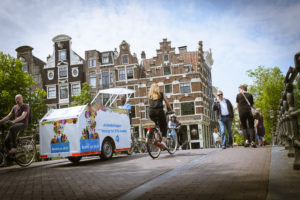City logistics is becoming more finely meshed and more frequent. The transport of freight in cities with heavy freight vehicles and light commercial vehicles leads to congestion, a poor air quality, noise pollution, and incidents. The maximum loading volume of heavy freight vehicles and light commercial vehicles is rarely needed for urban freight. The urgency to promote smart and zero-emission city logistics is growing. Light Electric Freight Vehicles (LEFV) may be one solution to current city logistics challenges. International research shows that many shipments in cities are suitable for delivery with LEFV’s. Logistics service providers using LEFV’s still only play a marginal role in city logistics, while the number of commercial vans in city logistics continues to grow. There is no large-scale production of LEFV’s yet.
There is insufficient understanding of the specific goods flows where LEFV’s can compete with traditional vehicles in city logistics, the right business model for providers of city logistics with LEFV and the optimum use of LEFV’s calls for a different design of the end-to-end supply chain. The Amsterdam University of Applied Sciences (AUAS), along with SME’s, research organisations and local government has started a research project to develop logistics concepts and business models for city logistics with LEFV’s: LEVV-LOGIC.
You can find relevant documents on Researchgate and follow the project progress.

